 Petzlover
Petzlover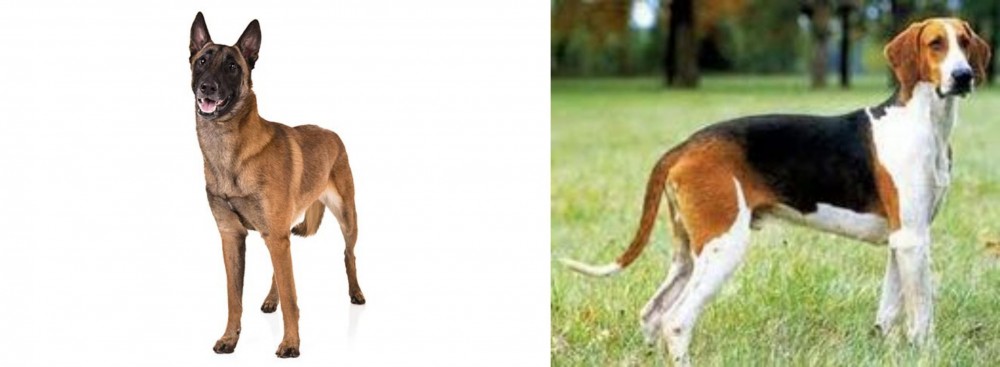 Belgian Shepherd Dog (Malinois) is originated from Belgium but Grand Anglo-Francais Tricolore is originated from France. Both Belgian Shepherd Dog (Malinois) and Grand Anglo-Francais Tricolore are having almost same height. Both Belgian Shepherd Dog (Malinois) and Grand Anglo-Francais Tricolore are having almost same weight. Both Belgian Shepherd Dog (Malinois) and Grand Anglo-Francais Tricolore has almost same life span. Both Belgian Shepherd Dog (Malinois) and Grand Anglo-Francais Tricolore has almost same litter size. Both Belgian Shepherd Dog (Malinois) and Grand Anglo-Francais Tricolore requires Low Maintenance.
Belgian Shepherd Dog (Malinois) is originated from Belgium but Grand Anglo-Francais Tricolore is originated from France. Both Belgian Shepherd Dog (Malinois) and Grand Anglo-Francais Tricolore are having almost same height. Both Belgian Shepherd Dog (Malinois) and Grand Anglo-Francais Tricolore are having almost same weight. Both Belgian Shepherd Dog (Malinois) and Grand Anglo-Francais Tricolore has almost same life span. Both Belgian Shepherd Dog (Malinois) and Grand Anglo-Francais Tricolore has almost same litter size. Both Belgian Shepherd Dog (Malinois) and Grand Anglo-Francais Tricolore requires Low Maintenance.
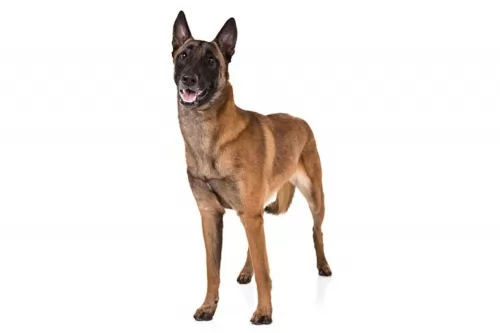 The Belgian Malinois is one of 4 Belgian Shepherd varieties. The dogs were developed- and hail from Belguim. The Malinois has a short, fawn colored coat. The American Kennel Club recognizes that the Malinois is a separate breed from the other 3 varieties. It was in 1892 that Professor Reul wrote the first Belgian Shepherd Dog standard, recognizing 3 varieties – dogs with short coats, dogs with long coats and dogs with rough coats.
The Belgian Malinois is one of 4 Belgian Shepherd varieties. The dogs were developed- and hail from Belguim. The Malinois has a short, fawn colored coat. The American Kennel Club recognizes that the Malinois is a separate breed from the other 3 varieties. It was in 1892 that Professor Reul wrote the first Belgian Shepherd Dog standard, recognizing 3 varieties – dogs with short coats, dogs with long coats and dogs with rough coats.
Today's Malinois goes back to a breeding pair owned by Adrien Janssens. It was in 1885 that he bought a fawn, rough-haired dog, breeding the dog with a short-haired dog named Lise de Laeken. After other breedings, the two dogs were recognized as ancestors of the modern Belgian Shepherd Dogs.
The city of Malines formed a club for the promotion of these fawn short hairs and the name Malinois became synonymous with them. In March 1992, the American Belgian Malinois Club received AKC parent club status.
 Originating in France, the Grand Anglo-Francais Tricolore has been recognized by the United Kennel Club in 2006. He was developed in France in the 1800s.
Originating in France, the Grand Anglo-Francais Tricolore has been recognized by the United Kennel Club in 2006. He was developed in France in the 1800s.
He is a rare breed, even in France. Today he is essentially a hunting- and scentdog and isn't really kept as a companion pet. The breed is recognized in France too by the French Kennel Club and also recognized internationally in 1983. In France today the dog is bred and kept primarily as a hunting dog and pet combined.
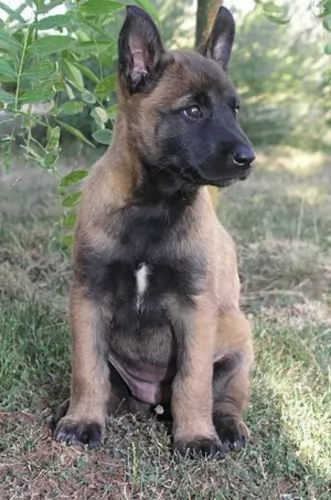 The Malinois is a medium-size Belgian shepherd dog. People sometimes mistake them for the German Shepherd as they are fairly similar to look at. The Malinois however is a smaller, lighter boned dog with naturally upright ears and a black-masked face. He is shorthaired and fawn-colored with black tips on the hairs, although other colors are brown or red too. He is an intelligent and active dog, always having been used for herding-, police- and rescue work.
The Malinois is a medium-size Belgian shepherd dog. People sometimes mistake them for the German Shepherd as they are fairly similar to look at. The Malinois however is a smaller, lighter boned dog with naturally upright ears and a black-masked face. He is shorthaired and fawn-colored with black tips on the hairs, although other colors are brown or red too. He is an intelligent and active dog, always having been used for herding-, police- and rescue work.
You’ll find the Malinois somewhat unpredictable as some are friendly and confident while other can be shy and withdrawn around strangers. This is a dog who loves to be around his human family, but to bring out the best in him, training and socialization classes will be necessary. Well-socialized Malinois are always good with children and other pets, more so if they’ve been raised with them.
 Looking quite a bit like its Foxhound ancestors,the muscular Grand Anglo-Francais Tricolore is a large dog standing at 60cm to 70cm tall at the withers and weighing in the region of 30kg and 35kg.
Looking quite a bit like its Foxhound ancestors,the muscular Grand Anglo-Francais Tricolore is a large dog standing at 60cm to 70cm tall at the withers and weighing in the region of 30kg and 35kg.
The Tricolore has a fairly broad, flat head, black nose and large brown eyes. His ears are set at eye level, they are medium length and floppy. The legs of the dog are straight and strong and the chest is deep and broad. The tail is long and slim. His double coat coat is short and smooth and he is tri-colored – tan, white and black.
Your Grand Anglo-Francais Tricolore has always been used as a hunting dog and scenthound and has been used in a hunting team. The dog has been created by crossing French scenthounds with English Foxhounds, with this particular dog being descended from crosses between the Foxhound and the tricoloured Poitevins.
There are actually 3 Grand Anglo-Français breeds, with this Grand Anglo-Français Tricolore being one. He is a docile dog and doesn't make a particularly good watchdog. The dog enjoys the company of other canines and while he can get on well with his human family, and is good and patient with children, he isn't the ideal pet with children, as his mind is on hunting and the chase and following exciting scents.
He is a dog totally dedicated to hunting and hunting in packs sees him getting on well in the presence of other dogs. His strong hunting instinct and his wish to roam on a scent makes it that he will require a very large garden.
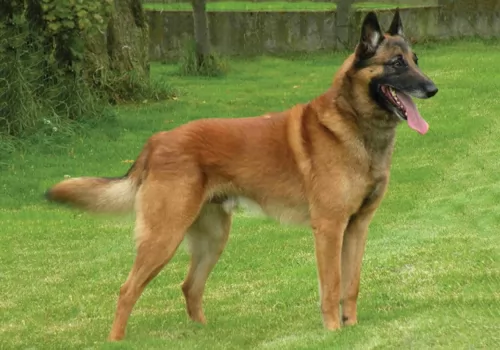 The Belgian Malinois makes a wonderful guard dog and he works hard to ensure that his human family, whom he adores, are well protected under his watch. They’re such intelligent dogs too that you may feel inclined to pass over some of your chores to him.
The Belgian Malinois makes a wonderful guard dog and he works hard to ensure that his human family, whom he adores, are well protected under his watch. They’re such intelligent dogs too that you may feel inclined to pass over some of your chores to him.
He responds well to training, and to get the best from this breed, start with training and socialization as soon as you bring your puppy home.
Socialization is excellent as it introduces your puppy to different people, animals as well as situations.
He is an adaptable dog and can live in an apartment if he is well exercised. He can be your devoted and loyal friend for a good number of years but you will have to do your part in providing him with the best care possible.
 The Tricolore is an excellent hunter but he also makes a good family pet. Because of the dog having ingrained hunting skills you won't find him being used essentially as a pet.
The Tricolore is an excellent hunter but he also makes a good family pet. Because of the dog having ingrained hunting skills you won't find him being used essentially as a pet.
He can be stubborn, but with training and socialization he can become obedient and amicable. He is a dog that will require a great deal of exercise as he is an exuberant dog and won't do well in an environment where there is scant regard to outdoor living and exercise.
While hunting is a great love of this tri-colored dog, he is also capable of being a loving and devoted pet.
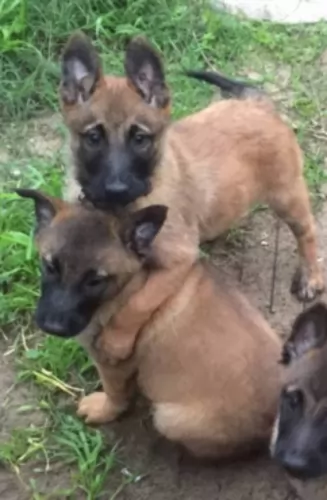 Belgian Malinois are generally healthy dogs. However every dog, regardless of breed, can pick up illnesses, and it is always wise to be aware of some of the diseases your Malinois might face.
Belgian Malinois are generally healthy dogs. However every dog, regardless of breed, can pick up illnesses, and it is always wise to be aware of some of the diseases your Malinois might face.
An inherited condition where the thigh bone doesn't fit properly into the hip joint. As the dog ages, arthritis can develop.
A degenerative eye disorder that can lead to blindness.
Brush his teeth at least 2 or 3 times a week to remove tartar build-up. Too much plague leads to inflamed gums, bad breath, pus inside the mouth and even loss of teeth.
 Living to be about 10-13 years of age, your Grand Anglo-Français Tricolore is fortunate to be a healthy dog, but just like many other dogs, he may well get sick and then, as a responsible dog owner, you need to get your 4-legged family member to the vet.
Living to be about 10-13 years of age, your Grand Anglo-Français Tricolore is fortunate to be a healthy dog, but just like many other dogs, he may well get sick and then, as a responsible dog owner, you need to get your 4-legged family member to the vet.
An abnormal hip joint can be hard for your dog as you notice him becoming less active and battling to get up after lying down. Hip dysplasia can lead to osteoarthritis, a limp and lameness. Get him to the vet so that you can at least help with making your pet's problem easier to bear.
Typically with deep chested dogs, the Grand Anglo-Français Tricolore can develop the life-threatening problem of bloat, when the stomach twists.
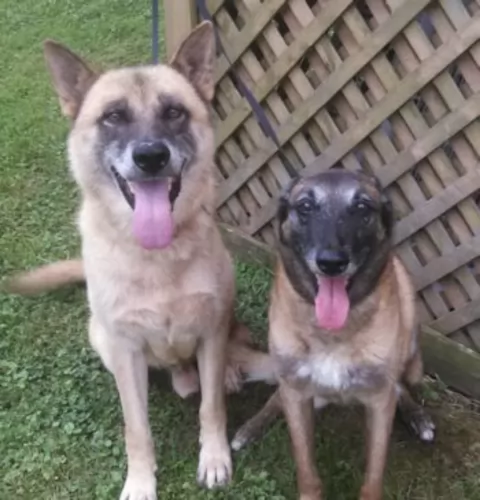 Because the Malinois is a constant shedder, with a couple of heavy shedding periods during the year, you’ll need to be conscientious with his grooming and brush him at least twice a week to get rid of loose hairs and to give his thick coat a glossy, healthy look to it.
Because the Malinois is a constant shedder, with a couple of heavy shedding periods during the year, you’ll need to be conscientious with his grooming and brush him at least twice a week to get rid of loose hairs and to give his thick coat a glossy, healthy look to it.
Because of their high energy, Malinois aren’t recommended for couch-potato type owners. It will be cruel to buy such a dog and to leave him to waste away with boredom and frustration in your back yard. He’ll want lots of rough and tumble, ball games, runs in the park or in the country and long walks.
Belgian Shepherd Malinois puppies are vulnerable when they’re tiny, and it would be wise to speak to your vet about superb nutrition to build up a puppy’s immune system.
An excellent way to ensure the health of your growing Malinois is to give him a home prepared meals along with commercially manufactured food recommended by your vet. You can’t just put a bowl of commercially manufactured dog food in front of him day after day month after month.
Apart from what your vet recommends, give him some brown rice, some cooked vegetables and some raw meat. Raw meat will ensure he can fight of skin infections. The age of the dog, emotional state and environmental influences can all play a role in skin diseases with dogs, but by ensuring some raw meat in his diet, the immune system is strengthened and skin disorders are eliminated. Always ensure a steady supply of fresh water.
 The exercise requirements of this breed are high and he thrives on being busy and being involved in a hunt. If you do happen to keep him as a pet, he will require plenty of intense exercise from going on walks to joining in with your jogging and cycling activities. He just never seems to get enough exercise.
The exercise requirements of this breed are high and he thrives on being busy and being involved in a hunt. If you do happen to keep him as a pet, he will require plenty of intense exercise from going on walks to joining in with your jogging and cycling activities. He just never seems to get enough exercise.
The Grand Anglo-Français Tricolore requires little grooming and will do well with a good brushing twice a week to remove loose hairs.
For your Grand Anglo-Français Tricolore to be strong and healthy, he'll need protein for strong bones and muscles.Protein needs to be the primary ingredient in an active dog's diet. If you're not sure, ask your vet about the best kibble to feed him and add in some raw meat to this every now and then.
Where possible, cooked brown rice, vegetables and chicken can be added into the kibble too to make his diet more interesting and healthy. Fresh, cool water should be reachable for your dog 24/7.